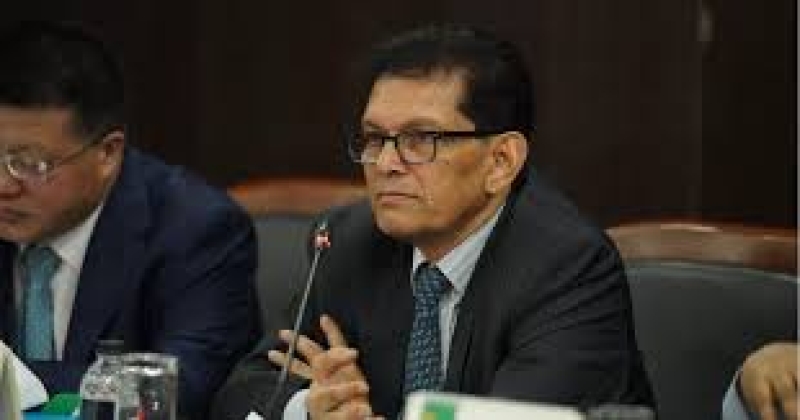- India Sees 9% Drop in Foreign Tourists as Bangladesh Visits Plunge |
- Dhaka Urges Restraint in Pakistan-Afghan War |
- Guterres Urges Action on Safe Migration Pact |
- OpenAI Raises $110B in Amazon-Led Funding |
- Puppet show enchants Children as Boi Mela comes alive on day 2 |
Dhaka’s Foreign Policy Now Fully Independent: Khalilur

Bangladesh’s foreign policy is now firmly rooted in strategic autonomy and shaped solely by its own national interests, said Dr Khalilur Rahman, National Security Adviser and the Chief Adviser’s High Representative on the Rohingya issue and other priority matters.
“We are no longer reliant on any country to shape our foreign policy. This marks a clear shift towards strategic autonomy,” Dr Rahman asserted on Sunday, describing Chief Adviser Professor Muhammad Yunus's recent visit to China as a “historic milestone” in Dhaka’s diplomatic evolution.
Dr Rahman was speaking at a high-level seminar titled “Reassessing Sino-Bangla Relations: Chief Adviser’s Landmark Visit”, hosted by the South Asian Institute of Policy and Governance (SIPG) at North South University (NSU). The event drew diplomats, academics, policymakers, and media professionals to discuss the future trajectory of Bangladesh-China relations in light of the recent diplomatic engagement in Beijing.
Highlighting future imperatives beyond the immediate context, Dr Rahman stressed the need for employment generation, productivity growth, technology adoption, relocation of manufacturing units, and building robust supply chain linkages.
He underlined Bangladesh’s balanced approach to regional diplomacy, saying, “We never view our relationships with China and India as a zero-sum game. Our aim is to maintain meaningful and mutually respectful ties with both nations.”
Chinese Ambassador to Bangladesh, Yao Wen, attended the seminar as the guest of honour and lauded the Chief Adviser’s visit as both symbolic and substantive. He reaffirmed Beijing’s commitment to deepening cooperation with Dhaka, particularly in education, healthcare, and people-to-people exchanges.
“This visit reflects a deeper foundation in our relationship—one based on solidarity between peoples, rather than the politics of changing governments,” said Ambassador Yao, noting the relevance of this partnership amid broader global economic transformations.
Dr Liu Zongyi, Senior Research Fellow at the Shanghai Institutes for International Studies (SIIS), emphasised the strategic and socio-cultural importance of bilateral relations. He reiterated China’s readiness to support Bangladesh’s post-LDC (Least Developed Country) graduation and strengthen trade and investment under the Belt and Road Initiative (BRI).
Senior Research Fellow Mohammad Sufiur Rahman of SIPG highlighted emerging areas of cooperation, including transboundary water management, agricultural development, and vocational and technical education. He also stressed the need for a people-centric approach that transcends day-to-day government agendas.
On the Rohingya issue, Rahman noted Bangladesh’s long-standing expectation for China to play a proactive role in stabilising Myanmar’s Rakhine State, to facilitate safe and dignified repatriation.
Foreign affairs analyst Syed Shahnawaz Mohsin urged for a grounded interpretation of the diplomatic developments. “This is not an isolated event but part of a broader recalibration of our foreign policy,” he said.
Professor Sk. Tawfique M. Haque, Director of SIPG and moderator of the event, echoed this sentiment. “This visit marks a pivotal shift in our foreign policy trajectory. At SIPG, we are committed to fostering informed and inclusive dialogue to support policy thinking.”
Delivering the keynote presentation, Dr Mohammed Nuruzzaman, Professor of Political Science and Sociology at NSU, traced the evolution of Bangladesh’s foreign policy since the “July Revolution,” noting that ties with China have now entered a more strategic phase. He also pointed out how complexities in Dhaka–Delhi relations have shaped the deepening engagement with Beijing.
Concluding the seminar, NSU Vice-Chancellor Prof Abdul Hannan Chowdhury expressed gratitude to all participants and reaffirmed the university’s commitment to research-driven policy dialogue.
He noted that the agreements signed during the visit—covering investment, healthcare, and technology—represent concrete progress with lasting benefits for the youth and the broader future of Bangladesh.

